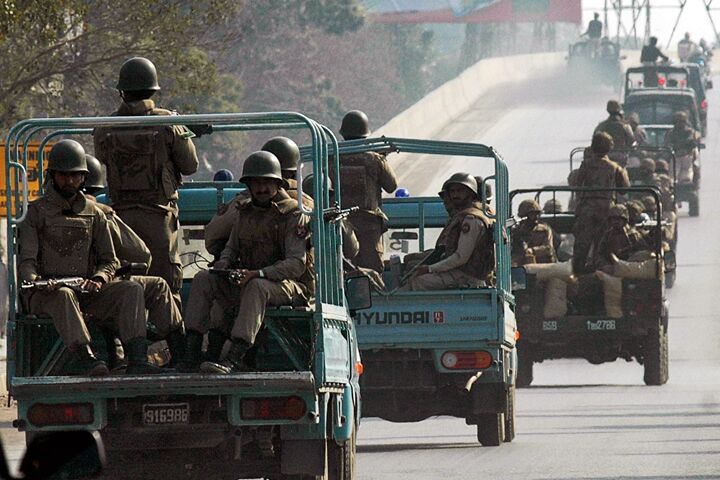
U.S.-Pakistani Relations in Crisis
The United States has been forced to take a harder line against the Taliban in Pakistan as the Taliban gains strength in Afghanistan. The Pakistani government is finding it difficult to stay on the tightrope between cooperating with the U.S. and maintaining public support. As a result, tensions between the U.S. and Pakistan are reaching a crisis point.
The intensifying insurgency in Afghanistan has led to U.S. strikes against the Taliban within Pakistan, which hosts Taliban training camps and lines of supply to terrorists in Afghanistan. While Pakistan’s new government, under pressure from Washington, has also increased its own operations in the tribal border areas of Pakistan, it has lashed out against incursions by U.S. troops. The U.S.-led fight against Islamist extremists is deeply unpopular among the public in Pakistan. Military action against the Taliban—or support for U.S. operations—risks turning public opinion against the state.
Although the U.S. Special Operations Command has reportedly conducted operations on Pakistani soil for years, the White House has recently chosen to make public that it is doing so without Pakistani permission. The New York Timesreported that President George W. Bush approved orders in July for U.S. special forces to conduct ground incursions inside Pakistan without Islamabad’s approval. Pakistani Army chief Gen. Ashfaq Kayani responded with a strongly worded statement last Wednesday: “No external force is allowed to conduct operations inside of Pakistan.” Pakistan’s sovereignty and territorial integrity, he said, would be defended at all costs. The following day, a Pakistani military spokesman went a step further, saying that the army was under instructions to hit back if confronted by any action by foreign forces on Pakistani territory (Stratfor, September 12).
Pakistan has always dragged its feet cooperating with Washington in taking action against al Qaeda and Taliban terrorists. Pakistan’s army and especially its intelligence agency have long been infiltrated by Islamist sympathizers. Mostly, the U.S. has just taken what cooperation it could get from Islamabad. Now, however, as the Taliban insurgency gets out of control in Afghanistan, this is not nearly enough. Though U.S. forces have undoubtedly conducted unilateral raids against al Qaeda on Pakistani territory in the past, according to Stratfor, they are now extending such unilateral operations to the Taliban.
Islamabad has largely taken the approach of appeasement toward the Taliban, making peace deals in return for temporary reprieves—and political capital with an Islamist-sympathizing population. This has only resulted in a strengthened Taliban both within Pakistan, where they maintain base camps, and across the border in Afghanistan—where coalition forces are feeling the effects. Stratfor explains (ibid.):
In the past, their level of activity was insufficient to warrant destabilizing American relations with Pakistan. That is no longer the case. The Taliban have grown much stronger, and U.S. and nato forces are under pressure from them. Reinforcements are being sent to them. But the base camps and the lines of supply that go into Pakistan are the center of gravity of the Taliban. The United States is no longer in a position to ignore this. The Taliban are too strong.
Therefore, the United States and Pakistan are on a collision course. The Taliban have roots in Pakistan and sympathizers in the military. Attacking the Taliban’s bases and cutting off the flow of supplies is difficult politically for Pakistan. The United States, on the other hand, is not doing well in Afghanistan. It needs the Taliban in Pakistan to be destroyed, and it is saying that if the Pakistanis don’t do it, the United States will have to—and this will take more than Special Operations forces to achieve. This moment was bound to come. The United States could not manage Afghanistan so long as the Taliban had sanctuary in Pakistan. The Pakistanis were not going to fight a war in Pakistan to solve the American problem. So we are now down to the final crisis of the war that began seven years ago. … Afghanistan is coming apart. The key to Afghanistan is Pakistan. Pakistan is unable, by itself, to deal with the Taliban. The United States has little choice but to abandon Afghanistan or go into Pakistan. Thus the crisis.
U.S. military actions within Pakistan could exacerbate the already deteriorating political, security and economic situation within Pakistan. This in turn will only provide further fertile ground for Islamists to take root and gain power within Pakistan. America, it appears, has no good options. As the Middle East Times recently wrote, “Almost every day the U.S. seems to learn something new about the limits to its capacity as the world’s one remaining superpower.”
Half a century ago, Herbert W. Armstrong gave the reason why America would increasingly find itself in such a position. Back in 1961, referring to the Bay of Pigs debacle, Mr. Armstrong wrote (Plain Truth, October 1961):
[U]nless or until the United States as a whole repents and returns to what has become a hollow slogan on its dollars: “In God we trust,” the United States of America has won its last war!
I said that when we failed to win in Korea! … I say it again now that the United States government endorsed this Cuban fiasco—its president gave the “go ahead”—and God, the God America has deserted, gave it its most humiliating defeat! What does the Cuban debacle mean? It means, Mr. and Mrs. United States, that the handwriting is on your wall!
And that is why the United States is increasingly finding itself in situations with no good options for victory. Because of disobedience to God, America has been cursed by a loss of national will (Leviticus 26:19). Read Mr. Armstrong’s free book The United States and Britain in Prophecy to find out more about what is prophesied to befall the U.S. in the end time.
